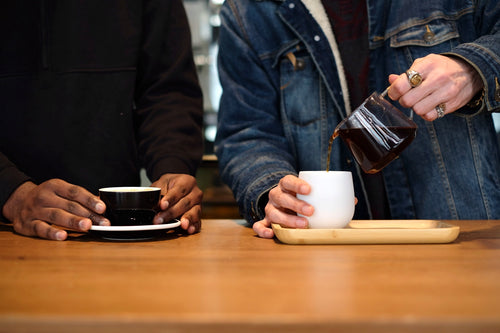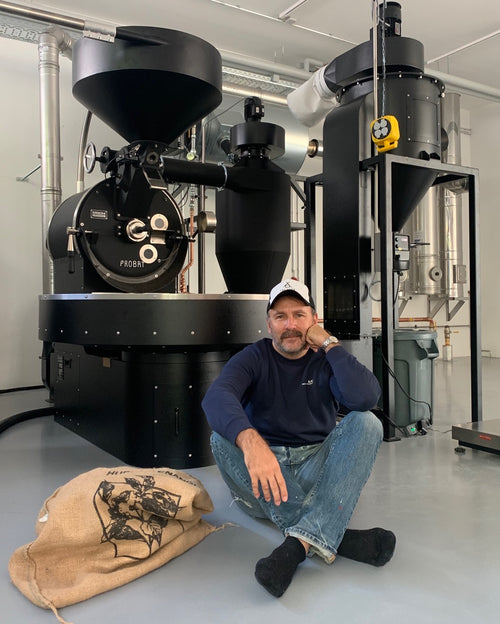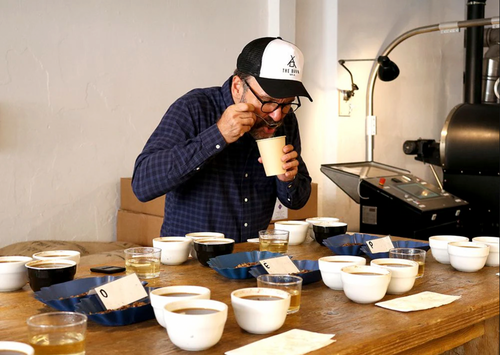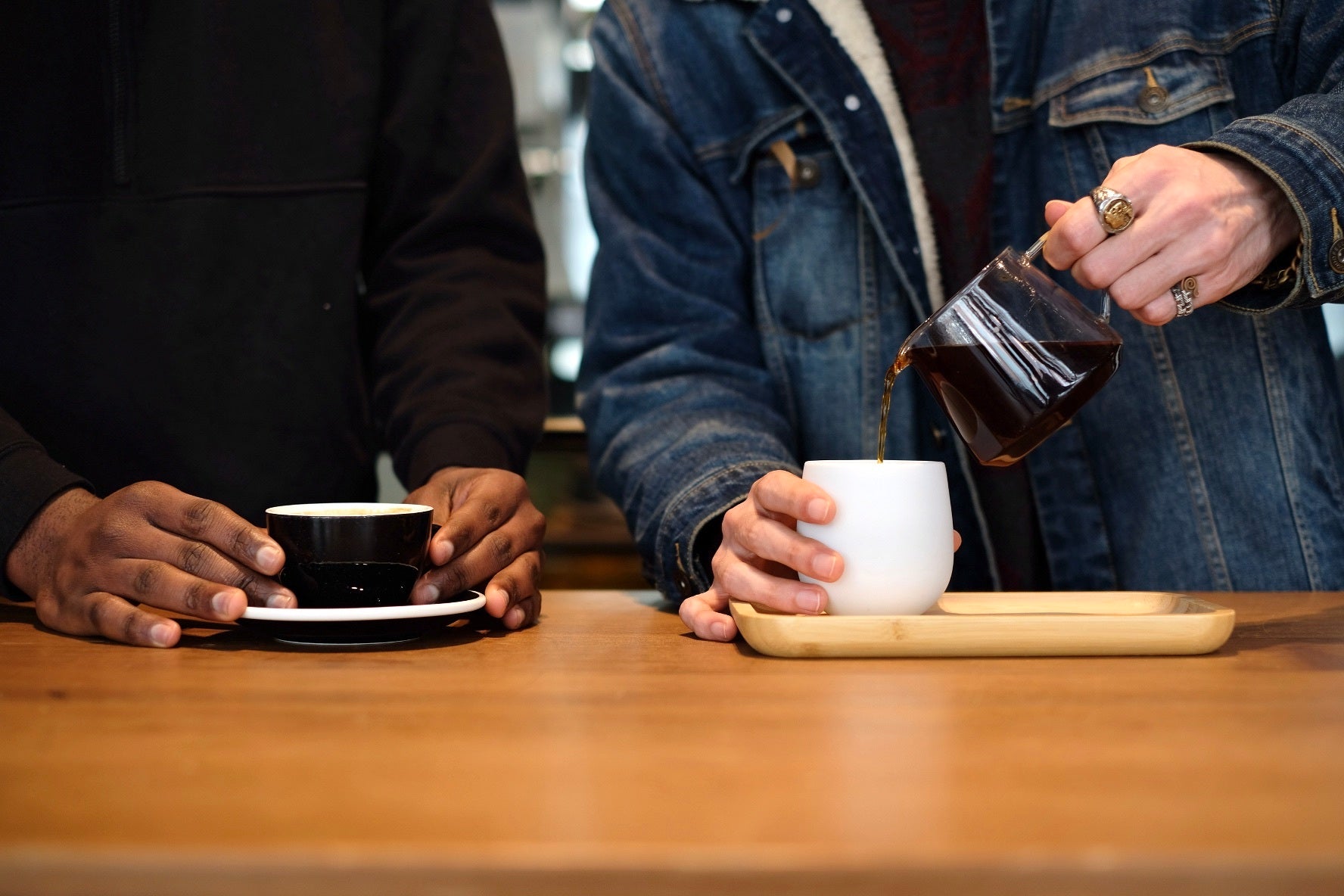MAURICIO SALAVERRIA
FINCA HIMALAYA, EL SALVADOR
During World of Coffee 2019 we were lucky to host some of the producers we work with, thanks to our export partner Belco. One of the producers was Mauricio, owner of Finca Himalaya, who is well known in the Specialty Coffee world for his passion for processing. We took this opportunity to ask him some questions about processing, challenges, and innovations...
What is your favourite processing method and why?
I would have to say natural, because it's the most challenging. That doesn't mean I don't enjoy the different types of honeys. The washes is something that is easier to do, so I think I come back to the naturals because there's so many variables - the temperature, the weather, the rain, the sun, the clouds, the movement of the coffee - but it all starts with perfect picking of the cherries. What we're doing here with the Himalaya Pineapple for THE BARN is the extra picking. We do a second picking afterwards when it's on the beds, so if there are a few unripe cherries that people left behind, the second picking will make sure it's perfect. After this we start the movement. The first five days is very essential, and after that is the slow dry. You cannot hurry a natural, especially the Himalaya Pineapple. On average we dry for 23 days, it might go up 5 more days or 6 more days, but if it's super hot then we might slow them down, and put them in a volcano shape and cover them to keep them hanging without drying them more. So it depends, we have to monitor that, and the person who is in charge of that is very important, I find. They need to know the climate situation and how each coffee is progressing.


Have you always worked in coffee?
My family has always been in coffee. I'm a fifth generation coffee grower and I think I'm one that still continues with the tradition with passion. A lot of family members that had coffee (farms) have either sold them, or don't work as hard on them anymore, whereas I do all the marketing and only grow specialty and so on...
What inspired you to start producing Specialty Coffee?
When the prices (between commodity and specialty) differed, especially 13/14 years ago which came about with this last wave of interest in Specialty Coffee. It was a good time for me to start working on direct trade and customer relations with roasters. The prices (for commodity coffee) were just as bad as they are today in 2019, so I decided that to keep on going I had to do something different. So I started picking better cherries, I built my own micro-mill, then I went to my first Cup of Excellence, and now I think I have 10 COE out of the 14 times I attended. This also helped me out because it's a better presentation, buyers expect a certain degree of consistency. I also met two of my oldest clients there - one from Australia one from the US. In 2020 it will be the 10th year I have worked with my partner in the US, so we have our 10 year anniversary coming up!


What do you think the most unique thing about the Apaneca region, where your farm is?
In Apaneca where most of my farms are we have our mill that lies at 1300/1400 metres, which makes it cool at night but warm in the day. A lot of people in the know say that when coffee is drying it needs both cool and warm weather to expand the spectrum of flavours. So Apaneca is blessed with that climate. As simple as it sounds, the African beds work miracles too, because they make a more unique and more perfect drying, which also increases shelf life for the coffee.
Are there any challenges specific to your region?
Yes, if we're talking specifically about the 2019 crop we had rains in December, and we had rains in January - totally off season. So that affected a lot of the crop. And now with the 2019/2020 crop it's not raining as much, which means we have to monitor better. Although I got a report via whatsapp today that it rained 38mm last night, so that's a pretty good rain.
And finally, are there any exciting innovations coming up on your farm that you want to share?
Yes! When Ralf visited El Salvador in February, and he saw we have a system of resting our natural coffees in a type of wooden box. This was sort of by accident, the natural coffees (like our Himalaya Pineapple for the barn) take a long time to dry. When I say 23 days that's an average, but it might take longer. Sometimes I'm getting 100 or 60 bags of cherry and I don't have a place to put them, so I have to move them temporarily to these boxes. You can leave them there for 4-6 days, which opens up some space for us. After this we take the cherries that are ready down to the patio where it's hotter, which is basically where we finish the drying. It's a system Ralf I think enjoyed watching because in the end it's all hand-crafted, it's very slow. I think we have been doing naturals now for close to nine or 10 years, so the experience that we have - it shows in the final product. I was talking with other producers from places like Nicaragua and Colombia today who are visiting for WoC also - we all said the naturals are like an animal, a whole different animal. They can be tricky because there's so much to them so there is a big risk. Because remember, if a natural doesn't come out the right way - I can't sell it. If I do a washed coffee, and it's not up to the par of let's say, The Barn, I can sell it to somebody else - maybe not at as good a price as The Barn, but still an ok price. But if you have a defective lot, a natural that you tried to make super good but it isn't, then no ones gonna buy it. I spoke to Boyce about it today, and we have the same problems even though he is in Kenya and I'm in El Salvador. It is a risk, but that is also where the opportunity lies. I'm very happy to have my coffees here in The Barn because I just love the way Ralf and The Barn treats the roasting, it's amazing. So to be a part of this, and to be a big part of it, it's a partnership that I hope will go on for a very long time.
















